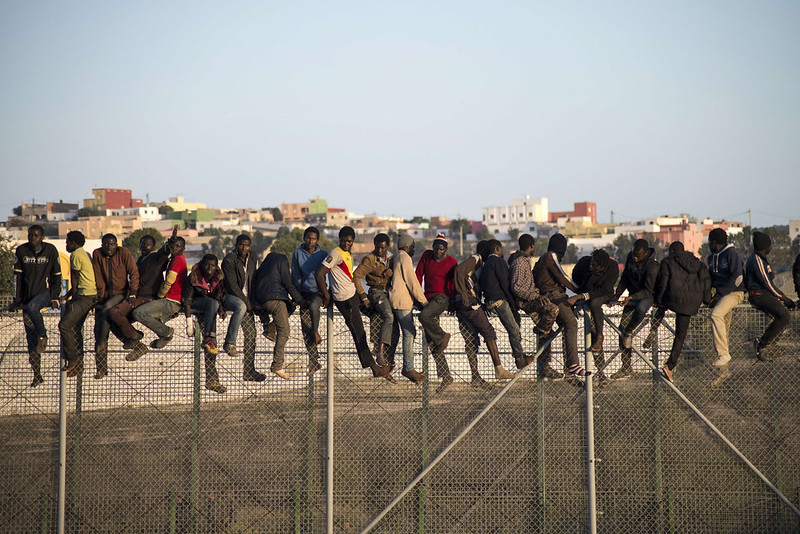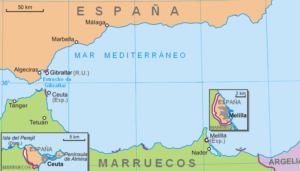Illegal Migration as a Bargaining Chip: Morocco’s Diplomatic Play in Ceuta and Melilla

Situated on the African mainland and bordered by Morocco, Ceuta and Melilla, Spain’s North African enclaves, have long been flashpoints in Spanish-Moroccan relations, driven by deep-rooted historical disputes over sovereignty. Morocco views Ceuta and Melilla as Spanish colonial relics, asserting its historical ties to the enclaves through the Islamic conquests of the 7th and 8th centuries, when they were integrated into the cultural and historical legacy of North Africa. In a 2022 letter to the UN, Morocco described the enclaves as “a prison occupied by Spain” and denied having land borders with Spain. Spain, in contrast, asserts its long-standing sovereignty, citing control of Melilla since 1497 and Ceuta since the existence of the Iberian Union (1580–1640), with the formal cession of Ceuta from Portugal occurring under the Treaty of Lisbon in 1668. Spain has now ruled Ceuta and Melilla for centuries, and both enclaves are currently recognized internationally as autonomous cities governed by Spanish and EU law.
Beyond the sovereignty dispute, Ceuta and Melilla have become recurring sources of tension due to the challenge of illegal migration. Ceuta and Melilla’s unique location on the African mainland makes them prime entry points for asylum-seekers and migrants attempting to reach Europe. Morocco has strategically leveraged the challenge of illegal migration as a diplomatic tool, controlling the flow of migrants to pressure Spain into political concessions, particularly regarding Western Sahara. As such, Morocco has turned the enclaves into powerful geopolitical bargaining chips, forcing Spain to navigate a complex and delicate balancing act.

The Persistent Challenge of Illegal Migration
While illegal migration in Ceuta and Melilla peaked in 2018 with 6,800 recorded entries, the issue remains pertinent. In 2023, an estimated 1,243 entries were recorded — a sizeable number given the enclaves’ size. However, these figures only account for intercepted migrants who successfully crossed the border; the actual scale of attempted crossings is much larger. For instance, in August 2023 alone, Moroccan authorities blocked over 3,300 crossing attempts into Melilla and 11,300 into Ceuta. Most of those attempting to enter the enclaves are from Morocco, Algeria, Tunisia and Sub-Saharan Africa. Their journeys are driven primarily by the desire for a better life.
Migrants intercepted at the border are usually returned to Morocco or their country of origin unless they claim asylum or are minors. However, verifying these claims is difficult due to a lack of documentation, and Spanish authorities, prohibited under international and national laws from deporting unaccompanied minors, are required to take care of them. Asylum seekers are temporarily detained while their claims undergo legal assessment.

Illegal Migration As A Nexus of Cooperation and Conflict
Since the 1990s, as the influx of migrants has grown, Spain and Morocco have cooperated closely on illegal migration and border control, even signing a bilateral agreement in 1992 to allow Spain to request the readmission of migrants from Morocco. Over time, Spain has increasingly relied on Morocco to manage significant portions of its border, a delegation further supported by the EU, which has strengthened its relationship with Morocco as a critical ally in illegal migration management. This collaboration includes financial and political support, such as the €148 million aid package in 2018 to enhance Morocco’s border management, alongside co-financed projects by Spain and the EU to reinforce border barriers around the enclaves.
While Spain’s reliance on Morocco to manage its borders fosters cooperation, it has also created a strategic dependency that Morocco has increasingly exploited in recent years. Morocco has used illegal migration management as a tool to exert political pressure and advance its territorial claims, particularly regarding Western Sahara. Western Sahara is a disputed Northwest African territory claimed by Morocco and the Sahrawi people, who seek self-determination through the Polisario Front.
Morocco’s exploitation of Spain’s strategic dependency became evident in April 2021 when, in response to Spain’s decision to provide medical treatment to Polisario Front leader Brahim Ghal — an act Morocco viewed as undermining its sovereignty claims — Morocco deliberately loosened its border controls, allowing around 8,000 migrants to enter Ceuta. The crisis escalated, prompting Spain to deploy its army, and sparking a major diplomatic standoff between both countries. The European Parliament intervened, acknowledging Morocco’s manipulation of illegal migration as a tool for geopolitical leverage. Morocco’s deliberate relaxation of border controls highlights Spain’s delicate balance between cooperating with Morocco on illegal migration and countering its political manipulation.
Spain’s Strategy of Appeasement
Instead of adopting a hardline stance against Morocco’s use of illegal migration as a geopolitical bargaining chip, Spain has pursued a strategy of appeasement in recent years, granting Morocco concessions and avoiding actions that might provoke it. This approach became particularly evident in 2022, when Spain endorsed Morocco’s autonomy plan for Western Sahara, effectively supporting Moroccan sovereignty over the territory and abandoning decades of neutrality.

Spain’s new strategy of appeasement was reinforced at a summit in Rabat in 2023. Spanish Prime Minister Pedro Sanchez expressed Spain’s intentions to reset and repair the relationship with Morocco, committing “to mutual respect” and avoiding actions that could offend “the other party” or either nation’s “respective spheres of sovereignty”.
Spain’s strategy of appeasement has influenced political behaviour domestically, with Sanchez’s Socialist Workers’ Party either remaining silent or voting against resolutions critical of Morocco. In February 2023, Sanchez’s party notably voted against a European Parliament Resolution urging Morocco to respect human rights. In pursuing its goal of appeasement above all else, Spain has compromised its commitment to human rights, exposing a contradiction between its self-portrayal as a human rights advocate and its actions in this context.
Sanchez’s remarks underscore Spain’s effort to position itself as a mature, cooperative partner, willing to make concessions on Morocco’s political demands in exchange for Morocco’s cooperation on issues like illegal migration management while subtly advocating for reciprocal accountability from Morocco.
In fairness to Morocco, Spain’s strategy of appeasement is not solely based on Morocco’s use of illegal migration management as a bargaining chip. It also reflects Morocco’s alignment with Spain’s energy ambitions. Amid the Russia-Ukraine war, European countries are seeking alternative energy sources, and Morocco’s renewable energy potential and strategic location make it a key partner. Spain, aspiring to become a European energy hub, has strengthened its energy ties with Morocco, continuing to pursue appeasement not only to address illegal migration but also to support its broader energy strategy.
Morocco’s use of illegal migration as a bargaining chip has proven effective, particularly in the current EU context, where the rise of far-right movements and growing support for far-right political parties have driven a shift toward more hardline and securitized illegal migration policies among member states. In this environment, Morocco can leverage its control over illegal migration flows into the Spanish enclaves to exert greater influence on Spain and other EU states — ultimately using it as a tool to advance its political and territorial interests.
Edited by Rafay Ahmed.
Featured Image: “African Immigrants at the border fence between Spain and Morocco” by ¡¡¡!!!, licenced under CC BY-NC-SA 2.0.
